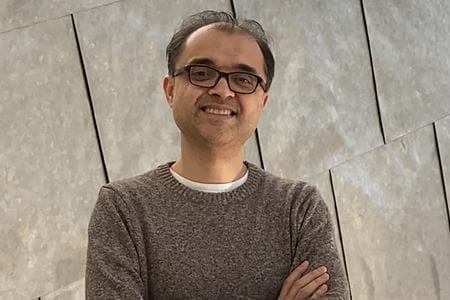INDIANAPOLIS—A beta blocker typically used to treat heart problems, hemangioma, migraines and anxiety could be a new therapeutic for patients with sickle cell disease. Researchers led by Ankit A. Desai, MD, associate professor of medicine at the Krannert Cardiovascular Research Center (KCVRC) at Indiana University School of Medicine, have been awarded a $3 million grant by the U.S. Department of Defense to evaluate the efficacy of this drug.
Patients with sickle cell disease, a red blood cell disorder that can cause harm to multiple organs when red blood vessels are blocked or when the cells break down, are at risk of major complications when they also develop heart damage. The median age of death is 43 years old.
“Cardiomyopathy or heart damage can predispose patients to a fatal rhythm disturbance called ventricular tachycardia,” Desai said. “We believe that inflammation plays a key role in both, creating this injurious heart and exacerbating it. We are deeply interested in translating this potential therapeutic to patients, developing a clinical trial and trying to understand the impact R-propranolol, given that propranolol appears to be well tolerated in patients otherwise.”
Propranolol is a mixture of two chemical formulations – R-prop and S-Propranolol, which are similar in composition. The only difference is that R-prop does not demonstrate as much beta blocker activity. The team also plans to evaluate potential for toxicity before introducing R-prop in a clinical trial.
“Evaluating a therapeutic that has already been consumed by millions for other diseases could help accelerate the potential use in patients with sickle cell more quickly,” said Desai, principal investigator of the study, a cardiologist at IU Health and leader of KCVRC’s Cardiopulmonary Research Program. “This grant will allow us to study heart injury as well as rhythm disturbance impact in preclinical models of sickle cell disease. The study funds a disease that is underrecognized and underrepresented and supports a broader goal at closing health care gaps.”
Desai will collaborate with Bum-Rak Choi, PhD, associate professor of medicine at Rhode Island Hospital and Brown University. He will work closely with Choi on data related to the development of fatal arrhythmias in sickle cell disease.
“While new therapies are being explored, cleverly repurposed drugs that have already had human exposure with strong safety profile, such as R-propranolol, stand to make major headway in solving a long-standing health issue affecting the heart and cardiovascular system in the United States and abroad,” said Rohan Dharmakumar, PhD, executive director of the KCVRC.
About IU School of Medicine
IU School of Medicine is the largest medical school in the U.S. and is annually ranked among the top medical schools in the nation by U.S. News & World Report. The school offers high-quality medical education, access to leading medical research and rich campus life in nine Indiana cities, including rural and urban locations consistently recognized for livability.
Cardiovascular
Beta blocker used to treat heart problems and other medical concerns could be new treatment for sickle cell cardiomyopathy

Ankit Desai, MD



